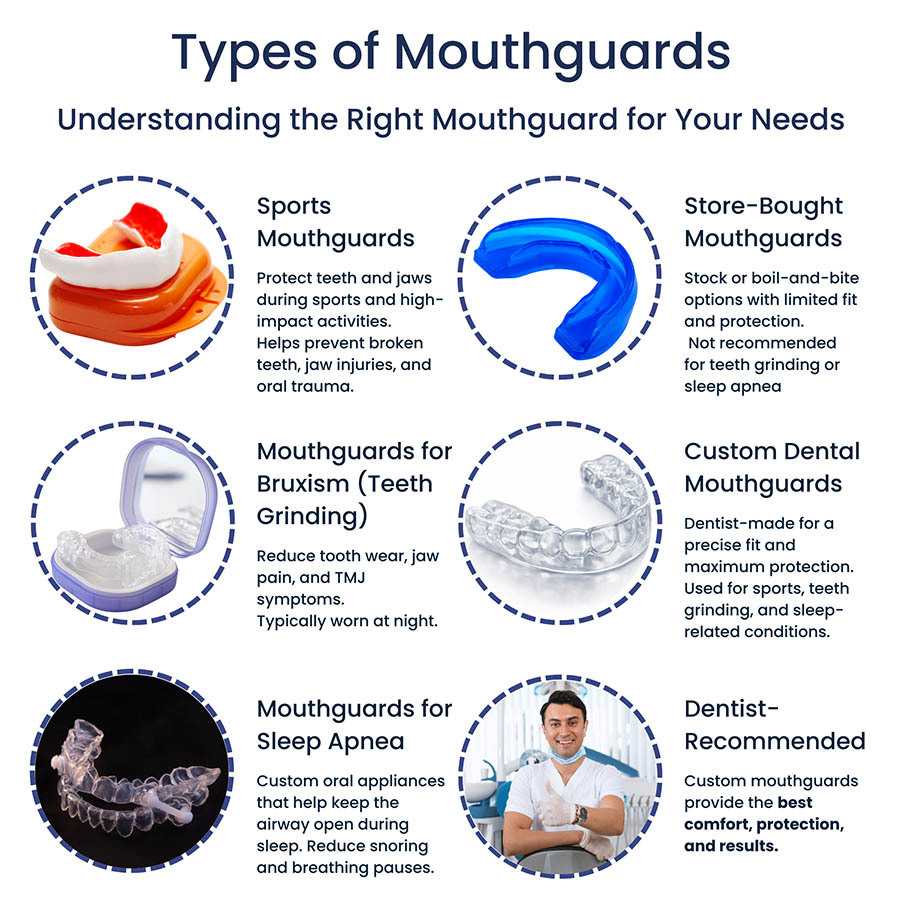A mouthguard is a removable appliance that is designed to cover teeth. It’s an excellent preventive measure for both adults and children. There are several reasons why your dentist may suggest getting a mouthguard, and adults and children can use them. Generally, a mouthguard fits over your upper teeth, although occasionally, your dentist may prescribe a mouthguard to fit over your lower teeth.

There are several reasons why you may need to get a mouthguard, including the following:
Mouthguards can be divided into several different categories depending on why they are needed.
Sports mouthguards are extremely popular and are worn whenever you play sports or participate in any other activity that could increase your risk of taking a blow to the mouth. Wearing a mouthguard can significantly help reduce the risk of knocked out or damaged teeth and can also help protect your jaws.
These mouthguards protect your teeth, gums, and jaw joints from becoming damaged due to teeth grinding and clenching. If you have TMJ disorder, they can help reduce its effects. Most mouthguards for bruxism and TMJ disorder are worn during the night because it tends to be a nocturnal habit or sleep disorder. However, some people may wear a mouthguard during the daytime as well.
Snoring can be a sign of sleep apnea and is characterized when someone frequently stops breathing for several seconds multiple times an hour and sometimes many times during the night. As their oxygen levels drop, the brain recognizes this, prompting the body to stop breathing again. Breathing usually restarts with a loud snort or gasp. The most common form of sleep apnea is obstructive sleep apnoea or OSA. Wearing the appliance for mild or moderate OSA can help treat this condition comfortably. The appliance works by placing the lower jaw slightly forward, helping to keep the airway open while you sleep and preventing snoring and pauses in breath.
It is possible to buy mouthguards cheaply over the counter, and there are two different types.
Neither store-bought mouthguard is suitable for treating problems with bruxism. They are also unsuitable for treating sleep apnea.
Your dentist creates a custom-made mouthguard. It is made using a mold of your mouth to fit you exactly. Because it is custom-made, it will be far more comfortable to wear. It can be adjusted to provide maximum protection and will not hinder breathing or fall out when you wear it. Although more costly than store-bought mouthguards, a custom mouthguard provides superior protection. If you like playing sports, it’s well worth investing in a custom-made mouthguard to help prevent sports-related injuries. It can be far more expensive and traumatic to have to deal with a dental injury, and the restorative costs can last for life. You will also need a custom mouthguard if you’ve been diagnosed with bruxism or sleep apnea. However, a custom mouthguard will last longer than anything you can buy over the counter.
Usually, a custom mouthguard is made from a tough thermoplastic material, so it is hard-wearing. The material is completely neutral, so it should not taste of anything. If you have a sports mouthguard, you may be able to choose your color or design to customize it and make it more fun to wear. Depending on their design, custom-made mouthguards for sleep apnea and bruxism can be made from a tough thermoplastic or another harder-wearing material.
Getting a custom-made mouthguard is very straightforward and entirely painless.
Your dentist will also discuss how frequently you should wear your mouthguard. If it has been prescribed to treat bruxism or sleep apnea, you will need to wear it every night. Initially, it may feel strange, so you must persevere. If your mouthguard is for sports, wear it every time, even during practices when you think there may be less risk of injury. Dental-related sports injuries can occur at any time when you least expect it.
If you have braces, your dentist can custom-make a mouthguard to protect them and your teeth. They can protect dental restorations like crowns, bridges, and implants against damage. In this case, it is important to get a custom-fitted mouthguard to ensure it will accommodate the shape of your braces or other dental restorations.
Wearing a well-fitting mouthguard can provide the following benefits:
It is essential to look after your mouthguard properly and to keep it clean. Make sure you clean it as shown by your dentist after every use and store it in the container provided. Just like with regular teeth cleaning, proper care ensures the best results. Don’t clean it in hot water or store it next to any heat source because this could distort it. Bring your mouthguard to every checkup so your dentist can ensure it provides maximum protection for your teeth and jaws and does not need replacing.
A mouthguard is a great investment in your smile. It could save you thousands of dollars over your lifetime, not to mention the trauma of having to deal with a dental injury. If you love playing sports or have habits that put your dental health at risk, visit Atlas Park Dental in Glendale, NY, to discover more about how a mouthguard could help you.
Book your dentist appointment today!

My name is Victoria Kushensky. I am a general dentist dedicated to remaining at the forefront of my field. Combining compassionate care with extensive knowledge, I offer cosmetic and general dentistry services as well as advanced root canal treatments.
I earned my Doctor of Dental Surgery (DDS) degree from the esteemed New York University College of Dentistry. Throughout my career, I have honed my skills in various dental procedures, ensuring effective treatment for each patient’s unique needs. I prioritize patient comfort and understanding, taking the time to thoroughly explain procedures and address any questions.
More about Dr. KushenskyAtlas Park Dental
80-28 Cooper Ave #207
Glendale, NY 11385
(718) 894-2110